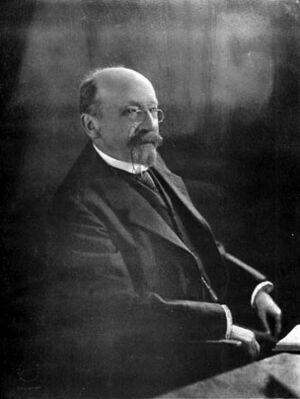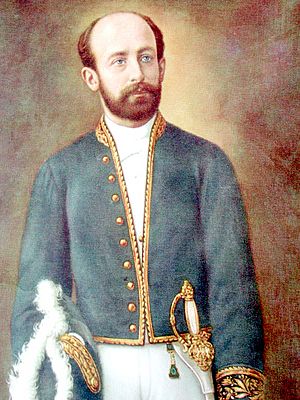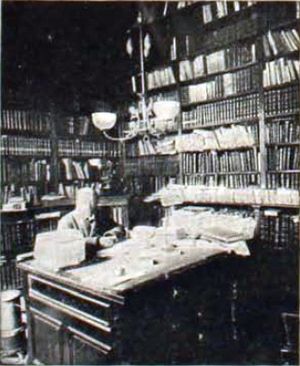José Toribio Medina facts for kids
José Toribio Medina Zavala (born October 21, 1852 – died December 11, 1930) was a famous Chilean historian, writer, and a bibliographer. A bibliographer is someone who studies and lists books. He was known for his many writings and for studying old books and documents from the time when Spain ruled parts of America.
Contents
Biography of José Toribio Medina
José Toribio Medina was born in Santiago, Chile. He was the oldest son of José del Pilar Medina y Valderrama and Mariana Zavala y Almeida. His father was a lawyer who traveled a lot for his job. Because of this, José Toribio lived in different cities like Santiago, Talca, and Valparaíso when he was young.
When he was thirteen, he moved back to Santiago to help his father, who had become ill. Later, Medina went to the Instituto Nacional General José Miguel Carrera. This school was led by the famous historian Diego Barros Arana. Medina then studied law at the University of Chile and became a lawyer in 1873.
One of his first published works was a translation of a poem called Evangeline. When he was 22, he became a secretary for the Chilean government in Lima, Peru. After returning to Chile, he wrote a history of Chilean literature (1878). He also wrote about the native tribes of Chile (1884).
In 1879, he helped Chile during a war against Peru and Bolivia. He found a better way to make cartridges for guns. Because of his efforts, he was made a military judge in 1880.
Later that year, he became a secretary for the government in Spain. This gave him a chance to explore old Spanish libraries. He visited Spain, France, and England many times. During these trips, he found many important historical documents and information about books.
He published many important works from his research. These included the Biblioteca hispano-americana, which was a huge list of documents about Spain's discovery and colonization of Chile. He also wrote Biblioteca hispano-chilena. He created a detailed history of printing in the La Plata countries (1892). He also wrote important books about the Inquisition in Chile, Peru, and the Philippines.
Before he died, he gave his personal library to the National Library of Chile. This amazing collection included 30,000 rare books. It also had 500 volumes of documents from before Latin American countries became independent.
Medina's Study of Ferdinand Magellan
In 1920, José Toribio Medina published a very detailed study about Ferdinand Magellan. Magellan was the explorer who led the first voyage around the world. Medina's book included lots of information about Magellan's life. It also described how his famous journey began and developed. The book even listed many of the crew members on Magellan's ships.
This important work was called El Descubrimiento del Oceano Pacifico: Vasco Nuñez, Balboa, Hernando de Magallanes y Sus Compañeros. Experts say that anyone who wants to seriously study Magellan must read Medina's book. This is because of all the amazing research he did in old archives.
Medina also created the most complete lists of books printed in Lima, Mexico, and Manila. He wrote many other smaller works too. No one else had done as much to help us understand the history of books and writing in the Spanish colonies. The Pan American Union even called Medina the "Humanist of the Americas." This title recognized his great contributions to knowledge.
Additional Works by Medina
José Toribio Medina wrote, edited, or translated about 282 different books, pamphlets, and articles. If you include new editions and other related works, he published over 350 items in total!
Here are some of the books he published between 1882 and 1927:
- 1882: Los Aborigenes de Chile. (About the native people of Chile.)
- 1887: Historia del Tribunal del Santo Oficio de la inquisición de Lima (1569-1820). (A history of the Inquisition in Lima.)
- 1904: La imprenta en La Habana (1707-1810). (About printing in Havana.)
- 1904: La imprenta en Lima (1584-1824). (About printing in Lima.)
- 1904: La imprenta en Cartagena de las Indias (1809-1820): Notas bibliográficas. (About printing in Cartagena.)
- 1904: La imprenta en Manila desde sus origenes hasta 1810. (About printing in Manila.)
- 1904: La imprenta en en [sic] Quito (1760-1818): Notas bibliográficas. (About printing in Quito.)
- 1906: Diccionario biográfico colonial de Chile. (A dictionary of people from colonial Chile.)
- 1908: El veneciano Sebastián Caboto: Al servicio de España y especialmente de su proyectado viaje á las Molucas por el Estrecho de Magallanes y al reconocimiento de la costa del continente hasta la gobernación de Pedrarias Dávila. (About Sebastian Cabot and his voyages.)
- 1908: Los restos indígenas de Pichilemu. (About native remains found in Pichilemu.)
- 1910: La imprenta en Guatemala (1660-1821). (About printing in Guatemala.)
- 1913: El descubrimiento del Océano pacífico: Vasco Núñez de Balboa, Hernando de Magallanes y sus compañeros. (About the discovery of the Pacific Ocean and its explorers.)
- 1923: La literatura femenina en Chile: (notas bibliográficas y en parte críticas). (About women writers in Chile.)
- 1927: En defensa de siete voces chilenas registradas en el Diccionario de la Real Academia Española y cuya supresión se solicita por un autor nacional. (A defense of Chilean words in the Spanish dictionary.)
See also
 In Spanish: José Toribio Medina para niños
In Spanish: José Toribio Medina para niños
- Maury A. Bromsen
- José Toribio Medina Award: This award is given each year to people who have made important contributions to Latin American Studies. It was created in 1981 by a group called the Seminar on the Acquisition of Latin American Library Materials (SALALM).
- La Biblioteca Americana José Toribio Medina: You can find more about this topic on Chile's Culture Portal.
 | Georgia Louise Harris Brown |
 | Julian Abele |
 | Norma Merrick Sklarek |
 | William Sidney Pittman |




